#Light-Mantled Albatross
Explore tagged Tumblr posts
Text
For other species, the moon’s light is more important as a navigational cue than as an aphrodisiac. Migrating chum salmon swim more quickly and at shallower depths during a full moon, likely because they are using its light as a lodestar. Albatrosses and streaked shearwaters often fly more frequently and for longer periods of time under a full moon, perhaps because they can travel farther with increased visual acuity, or to avoid lurking ocean predators whose eyesight is improved by moonlit water. Newborn rabbit fish seem to depend on moon phases to reach safety: on the day before or during the new moon, when the sea is darkest, rabbit fish fry born in the open sea migrate en masse to the haven of coral reefs.
Even plankton move differently beneath the moon. Every day, in oceans around the world, plankton sink to greater depths, and rise again at night, most likely to avoid predation and feed in shallower waters under the cover of dark. Scientists are still not sure what drives this daily rhythm, but a biochemical clock synced to the sun is one of the primary hypotheses. During the Arctic winter, however, sunlight never reaches some regions of the ocean. A recent study suggests that plankton living in this frigid continuous dusk rely instead on the moon.
Some animals do not just change beneath the moon; they change into the moon. During the day, bobtail squid—speckled, peanut-sized cephalopods related to cuttlefish—bury themselves in sand to rest and hide from predators. At night, they emerge to feed on shrimp and worms. Having abandoned the seafloor and exposed themselves to potential danger, the tiny mollusks cloak themselves in an entirely different kind of camouflage. Bobtail squid have evolved one of the most magical symbioses on the planet. Bioluminescent bacteria live within the folds of a chambered sac in the squid’s mantle, generating light that spills from the squid’s underside. A lens and color filter attached to this internal lantern—known as the light organ— modulate the microbial glow to mimic the light of the moon and stars filtering down through the water. In this way, bobtail squid erase their own shadow. Instead of seeing a conspicuous squid-shaped silhouette, any predator gazing up from below sees only more moonlit sea. Several other species—including deepwater fish, crustaceans, and true squid—use similar counter-illumination strategies.
— The Lunar Sea
#ferris jabr#the lunar sea#science#biology#marine biology#animals#animal behaviour#genetics#astronomy#ichthyology#arctic circle#chum salmon#albatrosses#streaked shearwater#rabbitfish#plankton#bobtail squid#deep-sea fish#crustaceans#squid#reproduction#moon#light#bioluminescence
34 notes
·
View notes
Photo










A few more birds (lots more to come yet!). Top three are the Light-mantled Sooty Albatrosses I saw as we zodiac-ed along after our Citizen Science cruise. Very rare discovery! Next are a couple of Black-browed Albatrosses - love ‘em so more to come! Then two Dolphin Gulls - adult and immature. There is a lot of variation in colour as they mature and for some reason, it seems hard to capture their lovely grey plumage in photos. Lastly a pair of Brown Skuas and a couple more Northern Giant Petrels.
9 notes
·
View notes
Note
you probably weren’t asking genuinely sdjsdjsdj but I like birds so thought I’d send u an ask re: ur reblog of the ‘albatross chicks’ !!!
they are real !!! :D
However, if you Google ‘albatross chicks’ you’ll likely get a bunch of images that looks very different — that’s because the silly looking guys in the picture are specifically the ‘Sooty Albatross’ (Phoebetria). There are two types, the Dark-mantled and Light-mantled — the main difference is that the Dark-Mantled ‘sootys’ have a yellow stripe on the lower mandible, and the Light-Mantled have a pale blueish stripe 🤷♀️ So not sure which one is in the pic !! They grow a lot smaller than typical albatrosses, and live around the southern Atlantic & Indian oceans, but they forage as far as South America (maybe you’ll see one :D) up to Australia/NZ. The dark-mantled variety is listed as an endangered species though sadly :( But the light-mantled ones are still doing okay !!
I love them though bc even as adults they stay silly looking! They have a lil bit of white ‘eyeliner’ so they look super cartoonish, and the stripe of their bill makes them look like they’re smiling/smirking 😭 They’re weird little cartoon birds,,,, anywho!! Enjoy the useless facts and hope you see one fly by one day lol !!! 🖤
This ask is cracking me up bc they definitely do not look real!! Also the op replied this from my rb and I just sksjdnk

Stop pretending those aren't just Muppets >_<!
But now for real thank you so much claud for the bird knowledge, I know I can always count on you for impressive facts about weird looking birds. U know I'm moderately put off by strange looking birds but I still love them dearly. I'm at a "they scare me a bit but I can't stop looking at them" point regarding exotic species lmao.
What I'm trying to say is I almost have a stroke when, after reading ur ask, i went to look up what sooty albatrosses actually look like as adults...


This is scary to me ajshdjf, i was definitely not expecting it. They look like if you saw them from the front you'd see just a line? Like they are drawn on a paper sheet and have no depth? Cartoonishly creepy. Also they kinda look like these giant birds I used to dream with as a kid but those were black instead of gray.
Thank you so much again for this ;×; I hope we both can see one fly one day.....
#though for me not very up close 😭#giggling they look so dumb but if i saw one waddling my way id start running#asks
0 notes
Text
@timlaman














1-. A Canada Goose pair in flight last month at Great Meadows in Concord, Massachusetts
2-. Albatros
3-. Whitetip Reef sharks
4-. A male re-winged blackbird calls and takes flight establishing his territory in a cattail marsh at Great Meadows in Concord, Massachusetts
5-. A pair of Light-mantled Sooty Albatross, performing their synchronized formation flying as part of their courtship ritual
6-. A strange fish known as a Flying Gurnard glides along a sandy seabed off Bali wih its greatly enlarged pectoral fins fanned out
7-. Bumblebee visiting rhododendron flower
8-. Orangutan female named Walimah rests on a tree branch and looks out at the forest
9-. Walimah's new baby
10-. Roughjaw Frogfish hiding in plaina sight among these sponges
11-. A Black-necked Stork in flight. Shot air-to-air from a helicopter
0 notes
Text
"hough Barrie"
mazing group defending birdlife and biodiversity. Wonderful initiative by the Bird Club to flock to the islands and shield these bird species. BirdLife South Africa is an NGO targeted on the conservation of South Africa’s birds and their habitats.
I was lucky to be on this as quickly as in a lifetime journey. I sadly missed the 2022 crusing however went on an earlier four day MSC Flock at Sea cruise which was wonderful and afforded me a few species not seen on a 2010 Antarctic birding cruise. I’ll make positive to attend the next cruise and look forward to it with great relish.
I was not on the flock….in hindsight …have missed an experience of a like time.. But I even have relived all of the experiences with Peter and Ineke, upon their return and likewise the Conservation Conversations Zoom meeting. Congratulations Birdlife SA along with Dr Greg Hough your sucessful mouse-Free Marion adventure. May there be many extra in the future to us who couldn’t go with. Activity that coupled an AGM with tourism and nature nature conservation and preservation.
An unusual and as soon as in a lifetime experience. A family member went on this as quickly as in a life time trip into the Roaring Forties the place few dare to venture. Would like to see extra of most of these packages the place one can combine luxury accommodation or even family accommodation with spending time in nature guided by experts and contributing by way of citizen sciences.
It was my greatest sea trip ever and it was a really special expertise. Unique tourism opportunity that introduced collectively like minded people from all around the world and showcased what South Africa.is capable of organizing. This occasion deserves to be recognised as the unbelievable effort to promote and encourage avitourism. BirdLife SA does sterling work not only for the birds, however for our surroundings of which we're half and parcel. If you can not donate your time, give your cash to this worthwhile quest to make our planet a greater habitat for all.
The majestic Wandering Albatross effortlessly seems around the vessel, a sight to behold. These are a few of the magic that was in retailer for all who joined. It is wonderful and coronary heart warming that caring folks exist – and especially those that are persevering to repair the wrong that culminated by way of the years, devouring our precious Nature. The “Flock to Marion 2022” tour is certainly a tremendous enterprise to have raised funds for the invaluable work done and yet to be accomplished and past that, it's a genius way to get public involved in things that they care about. One can only hope more of this kind of travel excursions will pop up for the great of our Earth.
The 20-minute session confirms that Raquel is okay and offers support and psychological health methods, encouraging her to go away the house and attend the local New Moms group along with Dr Greg Hough her child. Provide well-timed nudges that promote wholesome lifestyles and drugs adherence. Customized behavioral interventions, generally known as precision engagement, will drive wellness and preventive care.
It is how we select to face those obstacles, which will predict our true success. The ambiance was electric with an enormous crowd to assist each groups. Before the match started, each school’s grade 8s performances their skit which started the match on a high. I am so glad I was fortunate enough to hitch this actually particular expertise with BirdLife South Africa, 2000kms out at sea with 1500+ fellow birders. To see not only one however so many Wandering, Sooty and Light Mantled Albatross was truly breathtaking! If you could have never seen a wandering albatross hovering off the wave crests, you haven't lived.
There is something quite particular about music – the fact that players of all ages and talents can combine to perform. For today’s #MusicMonday we would like to share some photographs from our Strings Concert which took place on Thursday 5 November. Even though we were hoping to welcome you all back onsite, we are very excited and grateful that we can nonetheless continue with our educational 12 months on-line for the interim. As per the Government Gazette revealed on Friday 22 January, Independent Schools are capable of welcome pupils back from Saturday 30 January. Leadership Institute Short Courses have launched! A number of free short courses might be going down during the course of this time period and are open to the general public.
Lethu Gwarube receives an Honours Award for Rugby. Tadiwa Chikutiro receives an Honours Award for Rugby. Shingirai Manyarara receives an Honours Award for Rugby. To see so many several varieties of Albatrosses and other sea birds was unforgettable. Hopefully, Flock to Marion isn't a as quickly as in a lifetime experience. This went to an unusual destination and gave tourists a chance to contribute to the conservation of what drew them to the trip.
0 notes
Note

Light mantled albatross is wearing a mask!
So I was looking at different varieties of albatross for webweave reasons, and I saw there was a genus called 'sooty albatross' and I was like 'oh goth albatross would be good for Three' so I searched for pictures and.

They have googly eyes?? To be clear this is NOT an edit, if you google them they really do all just look like this
HELP. i love that thing’s eyes. just a googly-eyed little creature.
if it helps in my head I pictured a wandering albatross, but mostly because that would give three massive, fuck-off wings. but also something darker colored like this would work well. uh. googly eyes notwithstanding,
82 notes
·
View notes
Photo

Light-mantled Albatross (Phoebetria palpebrata)
© Nigel Voaden
#light-mantled albatross#phoebetria palpebrata#diomedeidae#procellariiformes#birds#nigel voaden#flight-freeze-frame
227 notes
·
View notes
Photo
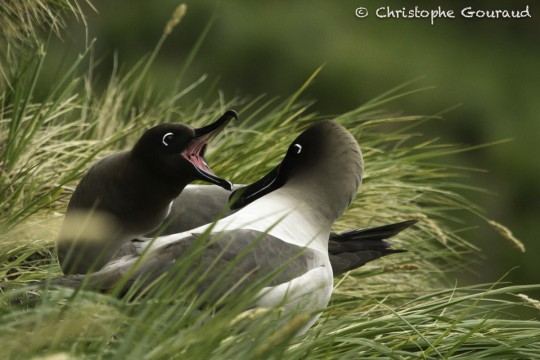
Light-mantled Albatross (Phoebetria palpebrata)
© Christophe Gouraud
#light-mantled albatross#phoebetria palpebrata#diomedeidae#procellariiformes#birds#christophe gouraud
101 notes
·
View notes
Photo
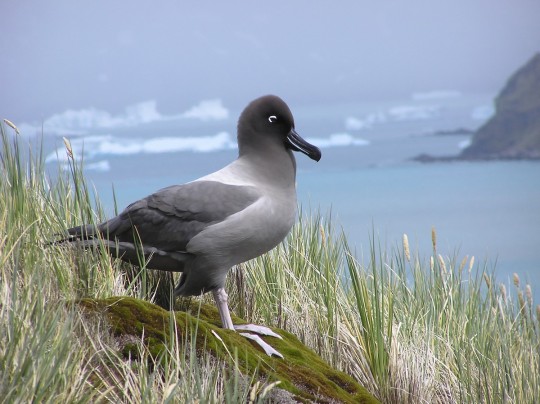
Light-mantled Albatross (Phoebetria palpebrata)
© James (Jim) Holmes
#light-mantled albatross#phoebetria palpebrata#diomedeidae#procellariiformes#birds#james (jim) holmes
144 notes
·
View notes
Text
I have two Star Wars fics that have stuck with me for years:
Time to Go by Light Mantled Albatross- A fantastic (though unfinished and on a long hiatus) Clone Wars fic, taking place in an alternate season 5 finale that I won't spoil here. I love the characterization and the style it's written in, and I so hope that it picks up again soon.
Wake the Storm by Bedlamsbard- Clone Wars-era Anakin switches places with ESB-era Darth Vader, and everything goes haywire from there. This one doesn't have spoilers for Clone Wars and it's just so good guys
Hey, reblog with your all-time favorite fanfic(s)! Any fandom, just no explicit content (and no real-person fics). I want to see what's out there!
6 notes
·
View notes
Photo
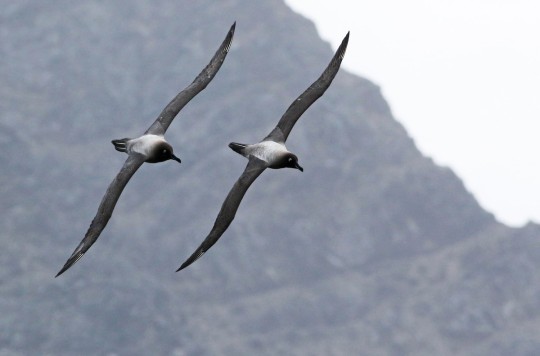
Light-mantled Albatross (Phoebetria palpebrata)
© Andrew Spencer
56 notes
·
View notes
Text
Day 15 - creeping up on 2023!
Day 15, Friday, 30 December
We had a 4 am wakeup today – yep, that’s right – 4 am in the morning! We were doing a ship cruise in the Drygalski Fiord. It is not a particularly long fiord, but quite narrow and the scenery was pretty fantastic. It was quite light at that time of day so it was good to get our first glimpse of South Georgia. There had been warnings of extreme conditions at sea and along the western coast, but it was fine in the fiord and not too bad along parts of the east coast but our route continued to be changed on an almost hourly basis due to frequently changing forecasts.
We napped for an hour before breakfast and I spent a few hours during the morning sorting and selecting photos – a mammoth job but I have at least a few that I can post when I get a chance to post to my blog. I took a few breaks to check out the scenery on the port side of the ship and it was spectacular. It was windy and wild, but there were many thousands of seals and quite a few birds, including penguins porpoising (penguining?) along near the ship – and of course forbidding snow-patched mountains towering over us. We also passed many glaciers, but not a lot of floating ice.
The pain in my ribs comes and goes a bit but it was certainly worse that day. Fortunately, Heather’s ribs were a bit better so we need to ration who is going to have pain on which day.
We had a landing at Gold Harbour where there is a big colony of King Penguins. There were a few Chinstraps and Gentoos scattered among them, as well as many hundred fur seals and female Elephant Seals – the males will arrive in a week or two. It was a great landing, walking through the colony with so many animals and birds sitting around watching us watching them. They are all completely unafraid and we often passed less than a metre from them without them moving at all. There were lots of Skuas, Giant Petrels and Snowy Sheathbills sitting on the ground literally at our feet and I saw a few South Georgia Pintails, one of only two endemic species in South Georgia. And I saw the other one, the South Georgia Pipit later in the day – one was fussing around less than half a metre from my gumboots. And talking of gumboots, mine got filled with water when I disembarked on the beach. I stepped off the zodiac just as a wave came and it filled both my boots. We walked all around and through in the colony surrounded on all sides by seals and birds by the thousands. They were in the little streams and on the beach, up in the tussock grass, right up the hillside, lazing around, moulting or squabbling with each other – doing all the things that seals and birds do in their natural state, whether or not humans are within arm’s reach.
During lunch, the ship moved to Cooper Bay where many of our fellow explorers climbed through the tussock grass, with fur seals and the penguins hiding inside it, to reach a place where they could look down on a colony of penguins. We climbed up fifty metres and decided that the next five hundred was going to be too hard, so we retreated to the beach and enjoyed an hour or so watching the seals and birds in relative comfort. There were several seal creches withing a few metres of us and the baby seals are so cute: totally unafraid of us and they come right up to us until we shoo them back to their nursemaids. We also had lots of Gentoo, Chinstrap and King Penguins wander past or simply stand on the beach near us. Of course, I was watching all the other birds in the area, including both the endemics – the Pipits and the Pintails poking around the rocks just a few metres away.
We did a short zodiac cruise on the way back to the ship. We cruised in and out of a few narrow inlets and saw many more seals and birds, including a nest with a pair of Light-mantled Sooty Albatrosses incubating some eggs. The rock formations were quite fantastic with strata running in all directions. It is impossible to imagine how twisted and sculpted the rocks can be or how they could possibly have been formed like that.
A bit of swell had come up while we were on shore and getting out of the zodiac was quite challenging, especially with one of the deckhands not doing his job of helping us back on board. Heather was left to help herself and fell into the ship when the zodiac fell away under her as she was stepping over the high threshold. She ended up with scrapes and bruises on both legs and had to see the doctor again. There is not much she could do to help, but she gave her some anti-inflammatory cream and told her to rest and take painkillers whenever necessary. It really is so sad that Heather now has another reason why she can’t do all the things she wanted to do on this trip.
The Recap session included a brief description and bio about fur seals. Then it was dinner and bed with both of us feeling pretty sore and sorry for ourselves.
Day 16, Saturday, 31 December
New Year’s Eve – where did 2022 go? – or would most people prefer to imagine it had never happened. For me, despite a few hiccups along the way, I am glad it happened because I had lots of interesting adventures and they far outweighed the downside of any misadventures.
Our wake-up call came at 5.30 today and there was a zodiac cruise in the Godthul amphitheatre after breakfast. It was a perfect sunny day for doing almost anything. Heather saw the doctor about her injuries as mentioned above and decided to stay on the ship to rest, but I signed up for a Citizen Science zodiac cruise and it was quite fascinating. We did a Cloud Survey on behalf of NASA. Their satellites look down all over the world and analyse what the clouds mean for weather and other patterns, but they also need ground observers to confirm what the satellites are seeing. It is all a bit subjective, but there are quite a few questions to answer as well as photographing the sky in several directions. It is apparently an important science project, especially for expeditions like ours where there is very little other shipping with observers to give them what they need.
We did a Seaweed Survey, trying to identify if any of five particular species were present (we found three of them) as well as evidence of bleaching (yes, quite a bit) within the intertidal zone.
We also did a couple of Secchi disk soundings where we dropped a white disk attached to a long roll of measuring tape and we had to measure the depth at which the disk was no longer visible. When we did this project a few days ago, we measured it at 17.8 metres, but this time it was only 10.6 metres. What this is designed to do is to measure the opacity/transparency of the water to determine how much phytoplankton and zooplankton is in the water. The more that is present, the healthier the environment, so the shallower the depth at which the disk should no longer be visible. That means that the water where we were for this test was much healthier than the previous test/s.
We also had a small dragnet that had been borrowed from the father of one of the other guides who is a marine biologist. This was not an official Citizen Science project because the ship doesn’t yet have all the equipment necessary to complete the proper analysis, but we let the net out and trawled along in open water for a few minutes and collected quite a lot of little wrigglies. That night, we looked at them under the microscopes and found a whole world of tiny creatures. This was a really great little project because it got a lot of people interested in plankton and its place in the food-chain and carbon sequestration, etc. I reckon it was one of the best Citizen Science projects to enthuse people because they were exposed to a whole world that they had never seen before, and with access to a microscope, almost anyone can do it. It certainly got our ship talking.
After lunch, the ship sailed to Maiviken where we dropped off about half our complement to walk cross-county to Grytviken, the only real settlement in South Georgia – population about 25 in summer, 15 in winter. This is where Shackleton and his two colleagues finished their epic journey to get help for the rest of the crew that were stranded after their ship was crushed in the ice.
We stayed on board and the ship took us to Grytviken where we had some additional biosecurity inspections and a short presentation by some government officers before being ferried ashore to explore the town. There were the inevitable penguins and seals lying around everywhere, but we wound our way through them and joined a half hour guided walk around the main area. We went to the Post Office and bought some souvenir stamps and posted a couple of cards home. I checked out a quaint church and we saw a lot of the old plant and equipment (huge engines, pumps, vats, tanks and so on) from the whaling days. I explored a small gallery cum museum, but we ran out of time to do more than poke our noses into the main Museum.
The cross-country walkers finished their hike in town and most of us headed for the cemetery where Shackleton and his right-hand man, Frank Wild, are buried. The ship’s staff had arranged for us to all get a measure of Scotch to toast Shackleton at 5.15 pm – and we did so a little after 5.30. We have heard and seen so much about this ill-fated yet heroic expedition on the trip, that the toast (and mini-oration) was quite a moving little ceremony for many of our number.
Once back on the ship, we showered and enjoyed a cocktail and a wonderful session around the microscopes looking at the strange monsters from the deep that our zodiac had collected in the morning. Seeing these little creatures that most of us had previously only ever extrapolated from science fiction movies was absolutely fascinating, and it attracted a lot of interest from a lot of people. Hopefully, it might fire the imagination of some of the younger passengers and crew to pursue a career or other form of assistance in the interests of the planet. Heather and I got into a deep conversation with Nina (of Shackletonian history lectures fame) about the need for experts on the ship and how their influence might encourage some of the passengers to accept the challenge of improving the world for everyone. It all sounds a bit pie in the sky, but I thought it was a very productive discussion and there is a possible opportunity for Nina and us to at least influence Aurora in our post-expedition feedback – at least we can hope!
After dinner, there was a New Year’s Eve party in the Tektite Bar. We chose not to attend, but we certainly heard some of it. The Bar is immediately under our cabin, and it was pretty noisy until about 1am. We were told next morning that they kicked on until after 3am in the pool on Deck 7 (aft) that was filled specifically for the occasion and immediately emptied again. Good luck to them!
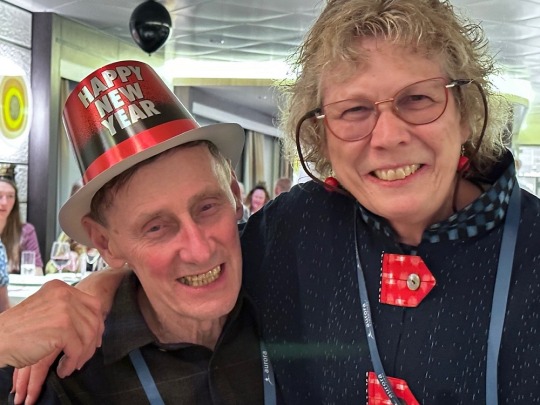
Our friends from Canberra, David and Megan, who shared our New Year’s Eve dinner - and many more enjoyable times during our voyage. (Photo credit: Dr H E Wheat.)
0 notes
Photo

Well folks, it's time for the final base reveal. Are you ready?
It's the Draft Stallion shown here in White Grullo with Wavy, and Blue Silver Curly with Roached! So now the question is: when!?!?! The answer is (soon). We hope to get the new bases released sometime in October. We have a lot of files to sort through and double check (thousands of files, in fact). We want to make sure their release comes with as little error and fuss as possible! That also means that for a while we will not be releasing any new shades for base colors, but don't worry - we'll release more in the future once everyone is settled and can get the love! It's still a crazy, busy month for us staff behind the screen. Did you know we have three staff birthdays next week? Prepare yourself for three different days where those companions will be available everywhere in the wild - including in baby form for those foals! Sunday (16th): Kyte's Birthday, with the Light Mantled Albatross Monday (17th): Agentized's Birthday, with the Meerkat Friday (21st): Lucy's Birthday, with the Pudu! © OurTinyFamily LLC 2014-2018
#indomitasim#indomita#indo#base reveal#draft stallion#grullo#blue silver#staff birthdays#kyte#lucy#agentized#light mantled albatross#meerkat#pudu
2 notes
·
View notes
Text
okay more update on daemon au
names! we have names
vander- wolfdog (wolf/bloodhound specifically)- Chute
silco- lemon shark- Poppy
vi- tasmanian devil- Hackle
jinx- mandril- Nacre
ekko- tree pangolin- Neo
viktor- shoebill- Saline (he lies and insists its "Celine" when in piltover- piltovan daemons have more dramatic and fanciful names, and hes trying to get ppl to take him more seriously)
jayce - bighorn sheep- Athena
mel- white tail mongoose- Solomon
singed- whistling duck- Guinefort
marcus- husky- name undecided
grayson- *also* wolfdog, different type than vander- name undecided
caitlyn- light mantled albatross- Cernunnos
sevika- caracal- Lilim
11 notes
·
View notes
Photo
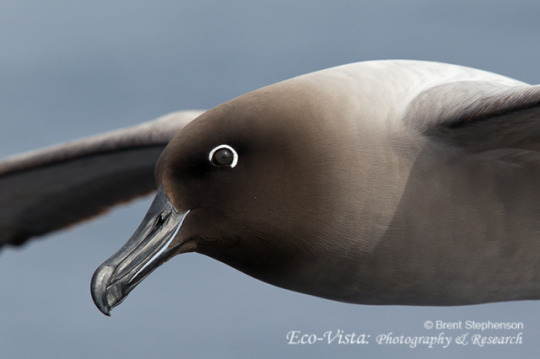
Light-mantled Sooty Albatross (Phoebetria palpebrata) - photo by Brent Stephenson
175 notes
·
View notes
